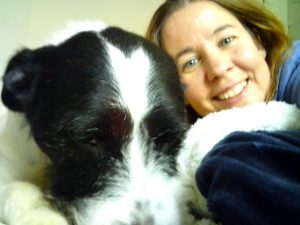To Randy, with forever gratitude.
Now you can rest in greater peace.
Michael Hingson wrote in his book Thunder Dog (2011) that true integration ‘’starts with desire, continues with education, and comes full circle grounded in trust.’’ Well. I think there’s more than just some trouble when it comes to autism and trust. In many people’s eyes I represent one of their worst fears, along with those in the early stages of dementia, those with brain injuries or PTSD: to not understand what is happening around you and be aware that you do not.

I know that I don’t trust my processing of this world, I cannot. My eyes get visual overload whenever there’s a light that is coming in too sharp; when it hits me, I cannot move around safely unless there’s someone I can fix my eyes on, moving slow enough to follow. Besides this, I cannot read facial expressions properly no matter how long I look at them. When someone’s aftershave, perfume or hair spray is too much for my nose, bolts of frustration and a non-cooperative stomach overtake me in seconds, so using public transport is very tricky for me even with help. My ears too, as much as I can enjoy some Mozart operas tremendously, just the repeated sound of an electric kettle in the office used to make me feel as deeply hopeless as one of the protagonists halfway through those operas.
I do not trust my autism either, therefore my article won’t be about what a great blessing it is or how autism spectrum disorders are necessary for the development of humankind. I witnessed the suffering (and in one case suicide) of generations of undiagnosed autistic men in the family, before I became aware of my own challenges. Near forty, I am now a couple of years after my autism diagnosis and the diagnosis of a slowly progressing severe connective tissue disorder that, apparently, teamed up with my autism.
I will share here what I do trust though, in hopes that it will help you embrace Autism more – and me myself. I trust my gut feelings. Even if I often struggle with picking up on others’ subtle messages, sarcasm and hidden meaning, I know instantly when things are out of the usual, when somebody’s falling ill, when something is not functioning. It could be the many little details my neurons are processing – all the time… I trust my heart. Of course, that bit of me is corresponding with autism too, thus my compliments would sound something like: ‘I love you so much it only took me seven months to tell you about it’ or ‘The more time I spend with you, the less I want to mask*’ and ‘You mean so much to me, I already memorised all your routines. Let’s talk about those!’. And still, this heart is resilient, dedicated and transparent as heck, take it or leave it.
I trust my inner compass. My strong tendency to observe a situation from multiple sides, always weighing up pros and cons. Speaking up when justice is being put down. Not letting go of things that I think deserve more faith injected into them, even when others are heading back to base camp. Stubborn like an aspie, I am!
Most of the time I am lost in this world of vehicles speeding by, various devices beeping and ringing for their lives, online presence demands pressing on, careers developing through a multitude of employments. If I’m lucky, I can maybe process forty percent of my environment at a time, of what is happening around me. And that would be somewhere in quiet green surroundings with squirrels being my only unexpected sensory intruders. Living by myself with care provided to me in visits, truth is, without this loyal sidekick, Mr Baxter my support dog – and friend, guide, sofa-warmer, unfailing tear-dryer – I would probably degrade into passive surrendering, overwhelmed by neurotypical streams and trends. Yet, I am somehow here and growing.
To write for this brave and much needed awareness campaign, I feel also means mentioning everything else I am too, besides being autistic: a believer, daughter, granddaughter, immigrant, employee, volunteer, student, recently – finally! – friend to some, an activist, a woman, someone’s future special, someone singing over others. If you come closer, over time you can realise: autism is only a part of me and, by the way, the rest is so much more interesting.
*masking: the mechanism of an autistic person applying neurotypical (non-autistic) behaviours in order to fit in or to avoid conflict.
By Lea